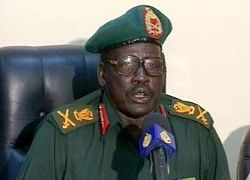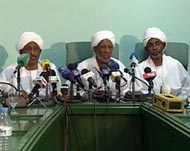Sudan militia rejects calls to disband
Faulino Matieb, commander of the South Sudan Defence Forces, has rejected calls to disband his forces, saying they were not bound by the terms of the peace accord signed on 9 January.

Speaking to Aljazeera on Sunday, Matieb said his pro-government militia – made up of 50,000 soldiers – would not disarm unless it reached an agreement on security arrangements stipulated in the peace deal, which was signed by the Sudanese government and the Sudan People’s Liberation Movement (SPLM).
The South Sudan Defence Forces (SSDF) are an umbrella of militia groups that have worked alongside government forces in protecting key oil and economic installations in the south, often clashing with the SPLM during the conflict.
Boycott drive
Also on Sunday, Sudan’s largest opposition party led a drive to boycott the constitution-drafting process due to seal the peace deal between Khartoum and the southern rebels.
 |
|
The National Congress party is |
The Umma party of former prime minister al-Sadiq al-Mahdi and 10 other opposition groups issued a joint statement charging that the makeup of a committee tasked with drafting the interim constitution was not representative of the country’s political landscape.
“The constitution is a document that expresses the consensus of the nation and all ingredients of the Sudanese people and should guarantee the rights of all parties, not only those of specific parties,” said the statement.
The Democratic Unionist Party of Muhammed Usman al-Mirghani was also a signatory and asked for the seat distribution on the 60-member National Constitutional Review Commission (NCRC) to be renegotiated.
Demanding representation
“We will not take part in the constitutional commission in its present composition, and we demand the representation of the political forces in accordance with their strengths and weights,” DUP deputy chairman Ali Mahmud Hasanain said.
|
“The constitution is a document that … should guarantee the rights of all parties, not only specific parties” |
A new constitution would clear the way for the formation of a national unity government, and mark the beginning of a six-year interim period called for in the 9 January peace accord that ended 21 years of north-south fighting.
The ruling National Congress (NC) party of President Umar al-Bashir and the SPLM have appointed delegates to the commission.
The NCRC was to have started work on 23 April, but its maiden session was delayed by protests from opposition parties, and the absence of several key officials attending an Asia-Africa summit in Indonesia.
Power-sharing
The NC and SPLM have insisted on applying general power-sharing quotas agreed upon in the January peace deal, which give them 52% and 28% of the seats respectively, leaving other parties a paltry 20% and no power to block decisions.
The Islamist opposition Popular Congress party of jailed leader Hasan al-Turabi has expressed reservations, but agreed to take part in the constitution-drafting process.
The Umma and DUP are larger than the ruling party and represent Sudan’s most powerful religious brotherhoods: the Mahdiya, which has strong support in the strife-torn Darfur region, and the Khatmiya, which is closer to Egypt and has grassroots support in the north.